Can Venture Capital Funds Pick Winners? Evidence from Pre-IPO Survival Rates and Post-IPO Performance STE-WP-23
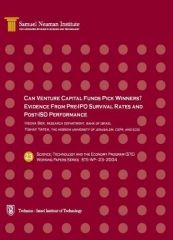
This paper evaluates the ability of venture capital funds to identify and bring to market successful high-tech Israeli companies during the period 1991 to 2000. Using a newly constructed and highly detailed database we find that: (1) The probability of survival until the IPO stage is higher for venture-backed companies. (2) According to several different […]
Immigrants in the Hi-Tech Sector: Comparison to Natives and the Effect of Training STE-WP-22-2004
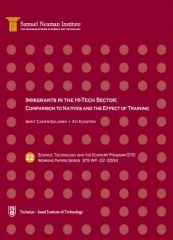
This paper provides a descriptive analysis of the integration of the immigrants from the CIS in the Israeli labor market and, specifically, in the hi-tech sector. The analysis is based on the national cross sectional Labor Force Survey and on a unique panel data that follows Russian engineers for up to twelve years in Israel. […]
Sustainable Energy Market in Israel
This document describes comprehensively and in detail the energy sector in Israel. Continuing with a “business as usual†approach to fossil fuel use can lead to a catastrophe of global proportions. The price that we, as a society, actually pay for energy is significantly higher than the amount that appears in our monthly bills, because […]
The global Environmental Market – An Economic Opportunity for Israel Primary model to assess the costs and benefits of governmental investment in the field of environmental technologies
Israel can and should play a viable role in the global market for environmental technologies. The role of the government should include not only direct financing of this sector, but also help in marketing, “door opening” and governmental insurance. The basic assumption of the model is that by using the governmental aid, the odds of […]
Sustainable Agriculture. How may the external values of agriculture be integrated as part of the farmer’s income, in the different areas of Israel

Agriculture takes a relatively marginal place in Israel’s economy today. The future of agriculture demands public intervention, and care. The need for sustaining agriculture is due to its external contribution, beyond its function in the production of food and fibers: aesthetical contributions in generating open green spaces; social contributions- values of the contact between Man […]
Innovation and the Limits of State’s Power: R&D and Industrial Policy in taiwan in IC Design and Software STE-WP-21-2004
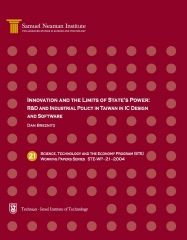
Of the East Asian Newly Industrialized Countries (NIC) Taiwan story is one of the most inspiring. In almost all accounts of Taiwan, the state has been described as the major impetus of economic development and technological upgrading. The Taiwanese government policy goal in the last decade has been to spur more new-products innovation capabilities. This […]
Analysis and Policy Recommendations for Technology Transfer from Universities to Industry. Final Report

This research was supported by the Israel Academy of Sciences and Humanities and the Ministry of Science, Culture and Sport. Science and technology are linked to each other and contribute to innovation processes which serve as an important source for economic progress and growth. The link between science (academia) and technology (industry) includes, among others, […]
The Global Environmental Market – An Economic Opportunity for Israel. First Position Paper, Analysis and Initial Conclusions
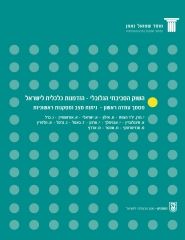
For decades, Israel has led the world in finding new methods of water conservation. More recently, its scientists have also developed pioneering methods of environmental monitoring, protection & remediation, recycling and waste treatment as well as alternative energy. Israeli firms in this field are increasingly active in the emerging markets of developing countries. Israel is […]
Total Factor Productivity as a Performance Benchmark for Firms: Theory and Evidence, SNI R&D Policy Papers Series
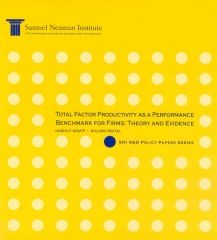
We propose using Solow’s macroeconomic approach and the concept of Total Factor Productivity (TFP) as a microeconomic tool for analyzing individual firms. TFP long used in analyzing macroeconomic growth among countries, is a useful strategic performance benchmark for individual firms. TFP calculations permit managers and investors to partition labor productivity growth between two sharplydifferent underlying […]
Evolutionary Venture Capital Policies: Insights from a Product life Cycle Analysis of Israel’s Venture Capital Industry, Science, Technology and the Economy Program (STE) – Working Papers Series STE-WP-20-2003
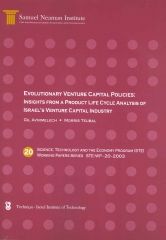
The significance of VC as a component of the Silicon Valley model of high tech has led many countries during the 80s and 90s to implement government policies aimed at stimulating this activity. This paper suggests that a major factor in the failure of many of these policies to create an early phase, high tech […]
